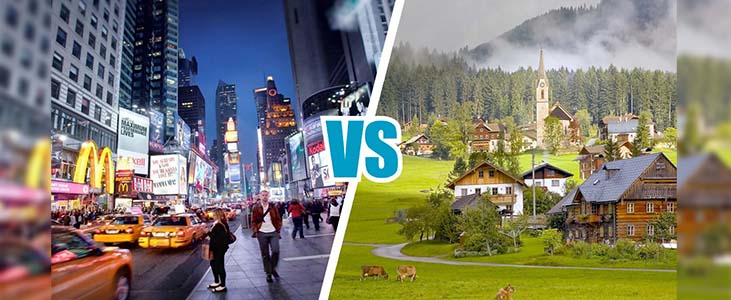Understanding The Difference Between Rural And Urban Society
Posted on January 31, 2022
Rural and urban are economically socially and environmentally interlinked spaces. The mutual benefits the rural society and urban areas got from their linkage is analyzed from the ecosystem services perspective.
Urban areas rely on rural areas to meet their demands for food, water wood, raw materials etc. which are basically products of rural ecosystem services.
Urbanization has transformed the way the industry structures, communities, and lifestyle used to be, and changed the thoughts, trends, behavior, values, culture, and so on. When it comes to material terms of definition, urbanization includes the development of public services and the modern infrastructure that contribute to the changing social and economic situations. People tend to buy property in Kerala based on the urbanized comforts and proximity to all the required amenities without having to face any risk.
Hence, urbanization has been a result of multifaceted and complex procedures that involved the migration of population from rural to urban areas, conversions of land, spatial reconfiguration, changing management, and governance system. There exists a vast difference between rural and urban society, and their lives are entirely different from each other, due to which urbanization has gained importance in this highly competitive world, where more people shift towards urban cities and hope for a well-settled life along with the benefits of urban societies. Flats in Calicut have also been trending with most people seeking the comforts of the city. This blog focuses on discussing in detail the difference between urban and rural society.
What is Rural Society?
Rural society has a simple culture with informal social communities and a natural environment, making agriculture and other production processes the core sources of income. The people in rural areas have homogeneity in their jobs, dress, social life, and language. Due to a very slow pace followed in the communication, the rate of change is slow in rural society.
Defining Rural: The term rural refers to the region which is located on the outskirts. It is far from city and industrial area. The source of income of the people who settled in rural area will be agriculture and animal husbandry. Another source of income will be cottage industries.
Characteristics of Rural Society
- Open settlements: Rural societies have open settlements. The house patterns are scattered and cover a huge and vast courtyard area.
- Independent house constructed with mud: The houses in rural societies are relatively poor households, made with mud. However, nowadays, houses built with bricks and stones are also seen.
- Agriculture: The core profession of the people in rural societies is agriculture. Most of the rural populations are engaged in agriculture for their income and food.
- Social norms are informal: There are no formal norms followed in the rural community, they practice informal social norms to be more important.
- Social groups are informal: Various groups are informal, and they usually gather in the evening to meet at a common place for sharing discussions and talking about issues that share common interests.
- Informal social interaction: The interaction is deep, periodic, and informal among various social groups and rural residents in the society.
- Informal social control: Panchayat system or informal control measures are used to find and solve everyday problems in care-seeking behavior.
- The literacy rate is less: The rural societies have people with low education, where females are usually discouraged to pursue formal and higher education.
- Slow social changes: The rural societies are normally static. They undergo very slow and gradual changes in social measures.
- Religious beliefs: The rural people are usually very emotionally attached to their religious beliefs. Society people are usually the followers of religious scholars and priests in their social lives.
- Lack of basic facilities: The basic and core facilities like educational institutions, hospitals, roads, communication systems, parks, fuel & gas, shopping malls, etc.
What is Urban Society?
Urban life is similar to having all the facilities of advanced and modern social life. Social interaction is increasing at a faster pace. The rates of change in social life are higher in urban society due to fast and formal interaction between the social groups. Life in urban society is highly formal and progressive, with a growing economy. Due to this faster pace of growth in urban society, there is higher job satisfaction and living status among the people in the society, improving Real Estate Market Trends in Calicut.
Defining Rural: The term rural refers to the region which is located on the outskirts. It is far from city and industrial area. The source of income of the people who settled in rural area will be agriculture and animal husbandry. Another source of income will be cottage industries.
Advantages of living in urban areas:
The advantages in residing urban areas includes a very easy access to various amenities, transportation, best educational institutions and medical facilities. There are also some disadvantages like pollution which results in the increase of health issues.
Top advantages of buying a home in urban area:
1. Socializing with new people: You will be able to meet new people where ever you move, but it will be a different experience in case of urban areas. Interactions with new people will give you a new experience and will give you a new perspective.
2. Activities: If you have lived in a city for more years, there is a chance that you know the city very well and have done everything there is to do. In cities there will be some activities to do every time who have variety of interests which will get rid of your boring. Almost all the towns have parks, malls, variety of foods to try, sports and so on. You can witness the performance of an artist or a musician by living in a city.
3. Attracting Salaries: Employers are willing to pay more due to the high cost of living in the city. This is one of the reason people commute to the city for higher pay and enjoy economic housing costs.
4. Job Opportunities It is not hard to find a job in the city. A city with reputed companies is a city with job opportunities. There are more chances, you will find a job that you love. Statistics shows that people who stay in urban areas find more job opportunities than those in rural areas.
5. Easy Transportation: In towns, you will find it difficult to drive or park your vehicle because of heavy traffic and to avoid this public transportation is a good alternative. Where ever you want to go, there are trains, buses and taxis in the cities.
6. Events: Cities held many events such as sports, festivals, baseball, art which will give you a different experience.
7.Dining options: If you are a foodie, you can find many authentic restaurants in cities. You will find the cuisine which you like in a mile or two.
8. Proximity to Airport: If you have to travel for work, it is easier to commute to the airport by living in the city than rural areas.
9. Other activities: You will see some activities expensive in the city, like buying a ticket for the performance of an artist. But there are some activities which are less expensive like visiting museums, enjoying sites and so on.
Significant Difference between Rural and Urban Society

Due to rapid urbanization, there has been an increase in the gap between both rural and urban society. However, rural societies are not still confined to medieval times; they are also evolving, but at a slower pace. Here are the key differences between rural and urban society that set them apart.
Industrialization
The urban society is greatly industrialized in the modern world with high-end access to the infrastructure, whereas, rural society is not. For the rural economy, this is restricted to small-scale businesses or family-owned industries. Urban development is at an incredible phase while rural development is still there, but takes time to be visible.
Environment
Rural society is encircled with life close to nature- heat, drought, rain, and winds are part of their daily life. However, on the other hand, urban life has moved away from the environment to a human-made environment away from nature.
Population Density
Rural societies have low population density with a lack of proper health facilities. This makes a good percentage of people migrate to urban areas for better facilities. Urban societies are densely populated, however, they have good provisions.
Population
The rural societies have a uniform composition of people, who have shared goals in common while the urban society is filled with heterogeneous people with various cultural, economical, and professional backgrounds.
Level of Interaction
Rural society is rich in informal and face-to-face interactions. You can find genuine relationships and great cohesiveness with rural people, while urban society falls behind in this regard. They have wider interactions but genuine relationships are hard to find. Since there are social dissimilarities among people in urban societies, the social interactions are highly formal.
Societal Pressures
Rural societies have firm pressures on them to adopt certain cultural and regional beliefs into their lifestyle since they are followed in common. However, on the other hand, urban society has its rules & regulations are based on the current land laws alone.
Societal Culture
While rural society consists of a robust and simple single-unit group, urban society has a double unit or multi-unit group of people. When rural is stable and almost static with fewer noticeable changes with years, urban society is evolving every day and continuously improving the standards of development.
Living Standards
Rural households have low living standards with improper home facilities, public utilities, educational facilities, and various medical or health facilities. Whereas in urban society, there is easy access to the aforementioned services and convenience to travel seamlessly.
Role of the Family
The role of the family is very prominent and highly significant in rural areas. Whereas in the urban areas, the hold of families is not firm, and the splitting up of families to nuclear setup has paved the way to leave the responsibilities of families to the various associations and organizations.
Conclusion
Urban-rural classification can give you insights into the difference between rural and urban society in terms of lifestyle, opportunities, and facilities. The scales of differences make people switch from rural societies to comfortable urban clusters. It is the urban society that contributes more significantly to national development compared to rural areas. High-end facilities like formal healthcare, better educational opportunities, and employment prospects highlight the difference between rural and urban society. Urban regions offer more jobs per person, while rural communities lack such amenities. This is why urban residences are in high demand, and real estate trends in Kerala clearly show an upsurge in people choosing to live in the city.
Are you checking out the best flats in Calicut for superior apartment projects? You have come to the right place. PVS Builders are one of the most trustworthy and reputed builders in Calicut, with some of the best laid out apartments in prime locations. Contact us today to know more!


